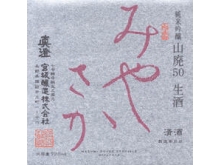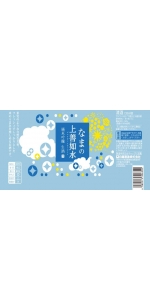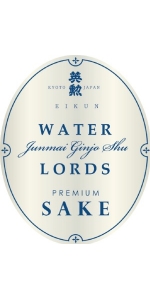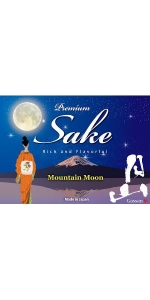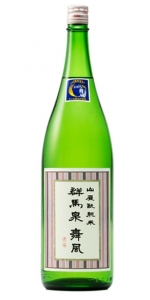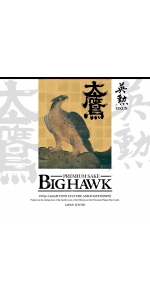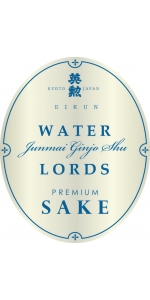Sake Miyasaka Yamahai 50 Nama Ginjo (720ml)
| Country: | Japan |
| Region: | Nagano |
| Winery: | Myasaka Brewing Company |
| Grape Type: | Miyamanishiki (kojimai) (Sake) |
| Vintage: | NV |
| Bottle Size: | 720 ml |
This unpasteurized sake is exciting and lively with a nose full of citrus, apple blossom and shizo. The palate is equally as bold featuring fresh persimmons, marshmallow and slightly underipe stone fruit. The finish is clean showing soft minerality.
POLISHING RATIO: 60%
ALCOHOL: 15.5
SMV +/-: +5.0
ACIDITY: 1.6
RICE KOJI: GOHYAKUMANGOKU
RICE KAKE: KOSHI IBUKI
YEAST STRAIN: K1801
FOOD PAIRINGS: Sushi Nigiri with fatty fish, oysters, omelettes, Lighter Italian, Chinese or French dishes
CHEESE PAIRINGS: Mildly ripe Coulommiers or Brie, Italian Raschera
Sake Eikun Junmai Ginjo Water Lords is made with Iwai rice.
Eikun sake uses water from a source called "Fusui", rated as one of the top 100 sources of water in Japan. This water source is located just south of the ancient Japanese, and still cultural capital of Japan, Kyoto.
Aromas of macadamia oatmeal cookie, spicy zucchini bread, and vanilla cream with a satiny fruity-yet-dry medium-to-full body and a layered, banana custard, jicama, salted whole nut, apple, and radish nuanced finish. A Wonderfully vibrant and flavorful sake.-Beverage Tasting Institute 94 points (Exceptional)
RATING: 94 points (Exceptional)
CATEGORY: Junmai Ginjo Sake, Sake
ALCOHOL BY VOLUME: 15.3%
TASTING LOCATION: In Our Chicago Tasting Room
TASTING DATE: Dec-05-2012
WINE ID: 200768
Woodsy honeycomb, nutshell, and mushroom patch aromas with a satiny fruity-yet-dry medium-to-full body and a delicate savory mushroom stock, chestnut, and golden beet driven finish. A fine choice for tempura. 91 Points -Beverage Tasting Institute
RATING: 91 points (Exceptional)
CATEGORY: Junmai Ginjo Sake, Sake
ALCOHOL BY VOLUME: 15.4%
TASTING LOCATION: In Our Chicago Tasting Room
TASTING DATE: Dec-05-2012
WINE ID: 200767
Savory nuances of toasted quinoa, banana bread, and nutmeg are present in the nose. On the palate, this sake is layered, lifted and complex, with flavors of plantain, dried cranberry, nougat, white Mushroom and almond.
POLISHING RATIO: 60%
ALCOHOL: 15-16%
SMV +/-: +3.0
RICE KAKE: 50% WAKAMIZU 50% LOCALLY FARMED JAPANESE RICE
YEAST STRAIN: PROPRIETARY
Rice milling: 60%
Rice varietal: Iwai (Only available in Kyoto)
Alcohol: 15%
Sake meter value: +3.0
Acidity: 1.3
Tasting Notes: --------
Eikun sake uses water from a source called "Fusui", rated as one of the top 100 sources of water in Japan. This water source is located just south of the ancient Japanese, and still cultural capital of Japan, Kyoto.
Review:
"Clear with a platinum blue cast. Aromas of coconut milk, melon, pear and rice pudding with a with a supple, dry-yet-fruity medium body and a vanilla, apple, and pepper accented finish. A robust and lively sake that will sing with spicy Asian cuisine."
- Beverage Testing Institute (July 2nd 2014), 91 pts
Sake Eikun Junmai Ginjo Water Lords 12/720ml is made with Iwai rice.
Eikun sake uses water from a source called "Fusui", rated as one of the top 100 sources of water in Japan. This water source is located just south of the ancient Japanese, and still cultural capital of Japan, Kyoto.
Aromas of macadamia oatmeal cookie, spicy zucchini bread, and vanilla cream with a satiny fruity-yet-dry medium-to-full body and a layered, banana custard, jicama, salted whole nut, apple, and radish nuanced finish. A Wonderfully vibrant and flavorful sake.-Beverage Tasting Institute 94 points (Exceptional)
RATING: 94 points (Exceptional)
CATEGORY: Junmai Ginjo Sake, Sake
ALCOHOL BY VOLUME: 15.3%
TASTING LOCATION: In Our Chicago Tasting Room
TASTING DATE: Dec-05-2012
WINE ID: 200768
Made with Iwai rice.
Eikun sake uses water from a source called "Fusui", rated as one of the top 100 sources of water in Japan. This water source is located just south of the ancient Japanese, and still cultural capital of Japan, Kyoto.
Rice milling: 60%
This edgy new label combines the vividness characteristic of nama (unpasteurized) sake with that unique marriage of acidity and depth achievable only through the yamahai brewing method.
Few sakes pair well with sauerbrauten and red cabbage, but this is one of them. Quite enjoyable with venison, and anything with a juniper-flavored marinade. A friend of coq au vin and other dishes braised in wine.
Rice Variety: Miyamanishiki
Polishing Ratio: 50%
Alcohol Percentage: 16.0%
Sake Meter Value: -2.0
Acidity: 2.0
Yeast Type: Alps
Myasaka Brewing Company
Masumi is one of the great names of the sake world, admired throughout Japan for its satisfying taste and unshakeable, down-to-earth reliability. The brewery where it is made was founded in 1662 in the town of Suwa, where a tradition of precision craftsmanship had led to the development of the silk spinning trade. Attention to detail remains at the heart of the Masumi brewing philosophy to this day.
In 1920, the brewery's president, Masaru Miyasaka, appointed a 28-year-old sake prodigy named Chisato Kubota to the position of brewmaster. The two travelled throughout Japan in the manner of Zen monks, "knocking on the door of the master and seeking knowledge." This keen desire to elevate the quality of Masumi sake, combined with a shared openness of mind, was rewarded in 1936 when Miyasaka Brewing Company won the first of many top honors at the Japan National Sake Appraisal.
Masumi achieved even greater prominence in 1946 when brewmaster Kubota, discovering a lovely aroma emanating from one of the brewery's fermentation tanks, requested that an expert from the National Research Institute of Brewing be called in for consultation. Samples were taken and it was soon confirmed that a new yeast variety, Association No. 7, had been discovered.
In the sake world, discovering a new yeast is like receiving the Nobel Prize, and only a handful of breweries enjoy this distinction. With its gentle, pleasing aroma and ease of use, No. 7 soon spread beyond Nagano Prefecture, and today continues to be used by over half of the breweries in Japan. In 2002, Masumi released a redolent, old-style sake with an insouciant 21st-century attitude called "Nanago" (No. 7) in tribute to the famous microorganism to whom the sake world owes so much.
- back
Arzuaga Ribera del Duero Crianza 95% Tempranillo and 5% Cabernet Sauvignon.
Dark cherry color with purple highlights. Powerful nose and high aromatic diversity of ripe red and black fruits, spicy and balsamic notes, and a roasted finish. Soft and mellow in the mouth with a great fruitiness and length.
Review:
This is a big wine with alluring aromas of cedary oak and black fruit. Ripe palate of black berries, some dark chocolate and integrated, polished oak. Long spicy finish. Classy Ribera. -Decanter 95 Points
Holocene Sidereal Pinot Noir is made from 100 percent Pinot Noir.
Single Vineyard dry-farmed, Organic practices
100% whole cluster
Fermented with native yeast
Extended maceration, with gentle extraction techniques
14 months in 20% new French oak
Bottled unfined and unfiltered with minimal SO2
The word sidereal means relating to the stars, particularly when measuring time or astronomical events. Which is weird for an earthly delight of a wine that makes time stand still while you attempt to decipher a vast array of aromas ranging from blackcap raspberries and cherry blossoms to wet slate and moon dust. Blackberries rule on the palate, with Assam tea, bay leaf and black pepper flavors easing along a lithe and nimble mouthfeel. Sidereal is also balance personified

